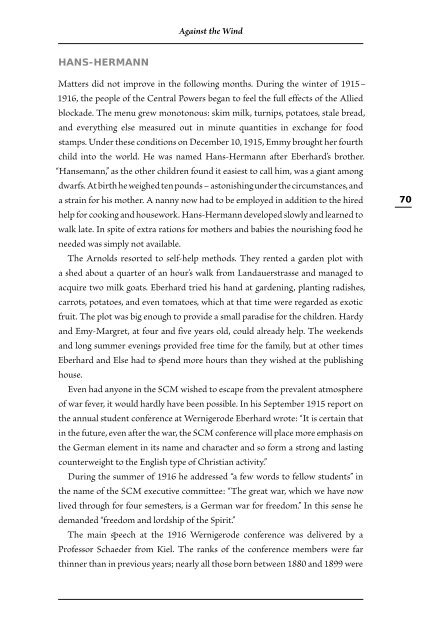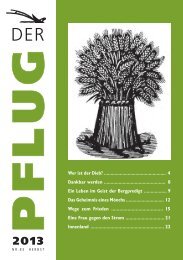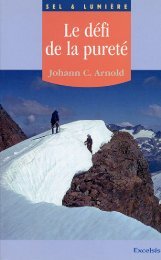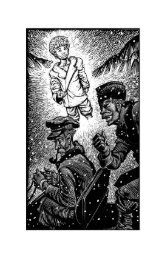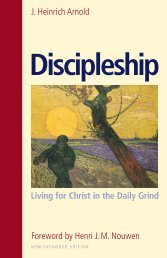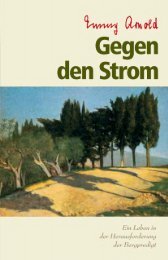Against the Wind: Eberhard Arnold and the Bruderhof - Plough
Against the Wind: Eberhard Arnold and the Bruderhof - Plough
Against the Wind: Eberhard Arnold and the Bruderhof - Plough
Create successful ePaper yourself
Turn your PDF publications into a flip-book with our unique Google optimized e-Paper software.
hanS-hErmann<br />
<strong>Against</strong> <strong>the</strong> <strong>Wind</strong><br />
Matters did not improve in <strong>the</strong> following months. During <strong>the</strong> winter of 1915–<br />
1916, <strong>the</strong> people of <strong>the</strong> Central Powers began to feel <strong>the</strong> full effects of <strong>the</strong> Allied<br />
blockade. The menu grew monotonous: skim milk, turnips, potatoes, stale bread,<br />
<strong>and</strong> everything else measured out in minute quantities in exchange for food<br />
stamps. Under <strong>the</strong>se conditions on December 10, 1915, Emmy brought her fourth<br />
child into <strong>the</strong> world. He was named Hans-Hermann after <strong>Eberhard</strong>’s bro<strong>the</strong>r.<br />
“Hansemann,” as <strong>the</strong> o<strong>the</strong>r children found it easiest to call him, was a giant among<br />
dwarfs. At birth he weighed ten pounds – astonishing under <strong>the</strong> circumstances, <strong>and</strong><br />
a strain for his mo<strong>the</strong>r. A nanny now had to be employed in addition to <strong>the</strong> hired<br />
help for cooking <strong>and</strong> housework. Hans-Hermann developed slowly <strong>and</strong> learned to<br />
walk late. In spite of extra rations for mo<strong>the</strong>rs <strong>and</strong> babies <strong>the</strong> nourishing food he<br />
needed was simply not available.<br />
The <strong>Arnold</strong>s resorted to self-help methods. They rented a garden plot with<br />
a shed about a quarter of an hour’s walk from L<strong>and</strong>auerstrasse <strong>and</strong> managed to<br />
acquire two milk goats. <strong>Eberhard</strong> tried his h<strong>and</strong> at gardening, planting radishes,<br />
carrots, potatoes, <strong>and</strong> even tomatoes, which at that time were regarded as exotic<br />
fruit. The plot was big enough to provide a small paradise for <strong>the</strong> children. Hardy<br />
<strong>and</strong> Emy-Margret, at four <strong>and</strong> five years old, could already help. The weekends<br />
<strong>and</strong> long summer evenings provided free time for <strong>the</strong> family, but at o<strong>the</strong>r times<br />
<strong>Eberhard</strong> <strong>and</strong> Else had to send more hours than <strong>the</strong>y wished at <strong>the</strong> publishing<br />
house.<br />
Even had anyone in <strong>the</strong> SCM wished to escape from <strong>the</strong> prevalent atmosphere<br />
of war fever, it would hardly have been possible. In his September 1915 report on<br />
<strong>the</strong> annual student conference at Wernigerode <strong>Eberhard</strong> wrote: “It is certain that<br />
in <strong>the</strong> future, even after <strong>the</strong> war, <strong>the</strong> SCM conference will place more emphasis on<br />
<strong>the</strong> German element in its name <strong>and</strong> characer <strong>and</strong> so form a strong <strong>and</strong> lasting<br />
counterweight to <strong>the</strong> English type of Christian acivity.”<br />
During <strong>the</strong> summer of 1916 he addressed “a few words to fellow students” in<br />
<strong>the</strong> name of <strong>the</strong> SCM executive committee: “The great war, which we have now<br />
lived through for four semesers, is a German war for freedom.” In this sense he<br />
dem<strong>and</strong>ed “freedom <strong>and</strong> lordship of <strong>the</strong> Spirit.”<br />
The main seech at <strong>the</strong> 1916 Wernigerode conference was delivered by a<br />
Professor Schaeder from Kiel. The ranks of <strong>the</strong> conference members were far<br />
thinner than in previous years; nearly all those born between 1880 <strong>and</strong> 1899 were<br />
70


